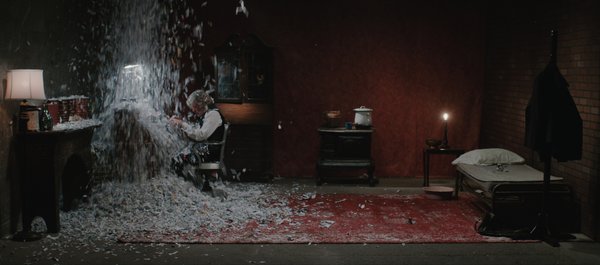Signals from the Studio… Artist Tom Pnini on New Entry Points to Understanding
In this segment of Artis’ audio interview series, we speak with New York-based artist Tom Pnini about tough decisions that artists make in the creative process, as well as the deep connections that exist between Tom's professional work as an artist and art educator.
In his video works, Tom Pnini creates controlled environments where multi-layered stories, illusions, and other visual phenomena take place. Tom uses theatrical and cinematic motifs in his videos, which often appear to be filmed in one take with minimal camera movement. His work Volcano Demo (2008) documents a performance where a paper-mâché sculpture of a volcano, installed on top of a building in Tel Aviv, is in a constant state of eruption, evoking tensions of day to day life. In The Light Fantastic Toe (2015), a work about a family during the American Civil War, viewers watch a scene unfold through a split screen that resembles a stereoscopic lens, where a deception is revealed: the video is not, in fact, a stereoscopic image. Rather, it is filmed using two identical film sets and twin actors. In Paperweight (2016), a late-career writer sits down at his typewriter to write, and shredded paper begins to fall on him from above. Over time, the writer and his workspace are completely submerged in the paper shreds—a manifestation of the internal conflicts that artists experience during the creative process. Telling stories that are both believable and fantastical, Tom tests the boundaries of cinematic media in his works.
In this interview, Tom speaks openly and honestly about a recent shift in his practice away from video making in his solo show Two Figures in a Field, which opened at Lesley Heller Gallery in New York in January 2020. An experiential installation, Two Figures in a Field is a tribute to sea travel that includes immersive sculptures and a vinyl album of sound works. Tom discusses this project in relationship to his practice as an art educator. He talks about opening an art studio for children, where his teachings are rooted in the inquiry and play-based educational philosophy of Reggio Emilia. Reflecting on this experience, Tom describes how teaching has made him a better listener, opened up new pathways of thinking, and has challenged barriers that he identifies in who can meaningfully engage with contemporary art.
This interview was conducted in the Spring of 2020, and edited for conciseness. It is part of Artis’ audio series, Signals from the Studio… , where we speak with artists from Israel, and delve into current topics in contemporary art and culture that they address in their practice. Signals from the Studio… is produced by Artis and made in partnership with journalist, urbanist, and writer, Yonatan H. Mishal, who hosts and edits the interviews. This episode was made with audio help from Michelle Rosen.
Participant Bios

Photos (left to right): Portrait of Tom Pnini. Yonatan H. Mishal, photo by Yuli Gorodinsky.
Tom Pnini (b. 1981, Israel) creates time-based works and large-scale installations. He has exhibited in museums and galleries in New York, Los Angeles, Milan, Toronto, Moscow, and Israel, including a solo show at Lesley Heller Workspace, in the Lower East Side, NY (2020 & 2017); a solo show at Chelouche Gallery in Tel Aviv (2015 & 2012); and a solo show at Giuseppe Pero Gallery in Milan, Italy (2015). He holds a Bachelor of Education (B.Ed.) from Hamidrasha College (2008) and a Master of Fine Arts (MFA) from Parsons School of Design at the New School (2010). He has received a CCA Video Art Fund award (2012), a Dean’s Graduate Scholarship from Parsons (2009-10), and an Outstanding Artistic Excellence Award from Beit Berl College (2008). His works have been acquired into numerous collections. He lives and works in New York City.
Yonatan H. Mishal is an urban explorer and writer, based in New York City. He currently works with the United Nations, in the department of global communications, and as a correspondent for Erev-Rav arts and culture magazine in Israel. His writing includes investigative journalism, commentary, reviews, interviews and art critique. His ongoing project in the past ten years of conducting interviews with curators and artists, aims to draw a real-time, first hand picture of the Israeli art scene.
To learn more about Tom Pnini's art practice
Readings about Tom Pnini's work and practice:
Romantic Conceptualism
Readings recommended by artist Tom Pnini
Educational philosophy of Reggio Emilia
Readings recommended by artist Tom Pnini




